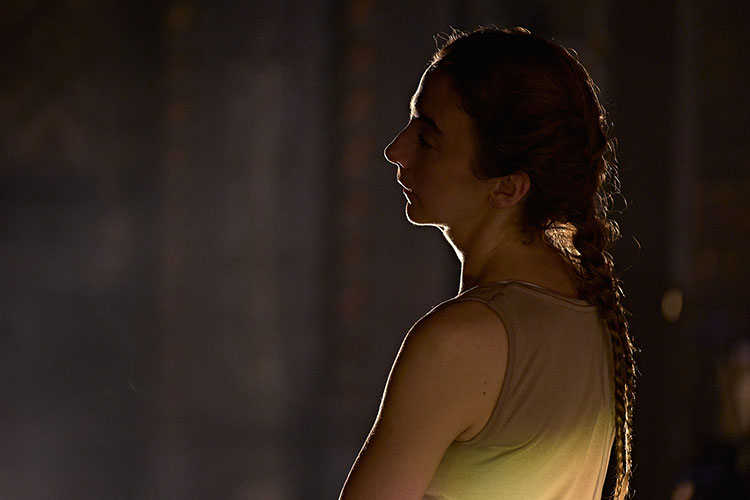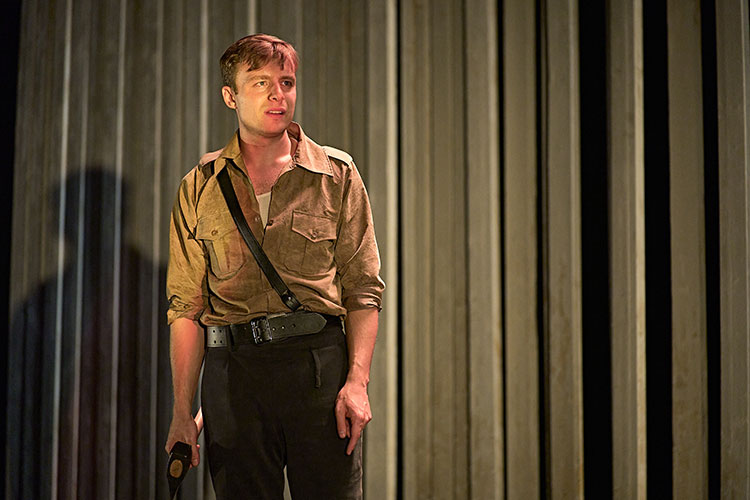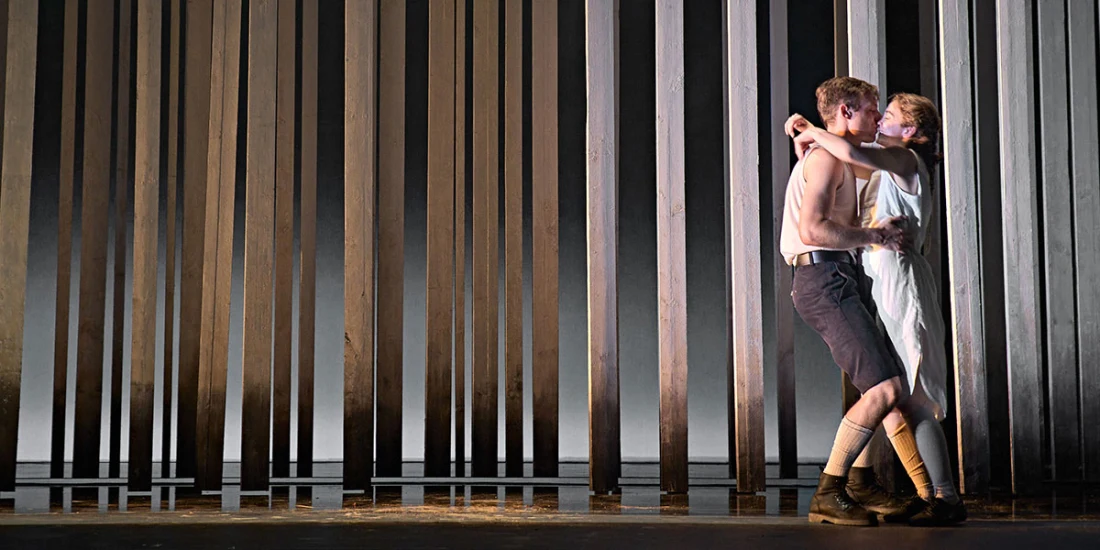Patsy Ferran and Luke Thallon on building chemistry and empathy in 'Camp Siegfried'
Patsy Ferran and Luke Thallon formed their own bubble while rehearsing for Camp Siegfried at The Old Vic. Although the actors had done some work on the new Bess Wohl play virtually, the nature of the story requires a fast and intimate connection between their characters and Zoom just wasn't going to work for the long term.
"The chemistry between these two people is pivotal," Ferran said. "If you already put on these literal physical barriers, it's just not quite going to land, because these teenagers are going through so many different types of awakenings, whether it be political or sexual. To put a two-metre distance, it's strange. It doesn't quite land."
However, Thallon commends the theatre's safety and testing protocols throughout the process to allow for this rehearsal environment to exist. "This is the safest I've felt," he adds, "and yet we are climbing all over each other."
The two-person play is set in 1930's New York at a German summer camp, where two American teenagers find themselves in an intense flirtation against the backdrop of an emerging World War and the rise of the Nazi regime. As the setting slowly reveals itself to be a hotbed for indoctrination and monolithic thinking, the kids are forced to wrestle with what they believe about the world and each other. Camp Siegfried is running at The Old Vic through 30 October.
We sat down with Ferran and Thallon over Zoom on a break before rehearsals to talk about how this story relates to today, playing American characters, and how theatre creates empathy.
You're playing American teenagers in the play. As British actors, what is your approach to the American youthful energy? Does it feel different than your initial inclinations?
Luke Thallon: Whenever we play something a bit shy or a bit introspective — not to say that Americans don't have that capacity at all — but theatrically, it reads as an English sensibility. I have a renewed awe for those big American titans of the stage, because what they were doing was just as technically amazing as what Olivier was doing. But there doesn't seem to have been that admiration poured on them as technicians, but to get through dense O'Neill, your technical capacity needs to be working probably harder than any other text. I'm having a ball being inspired by that and trying to get there. I'd love to do more great American plays, which I think this is one of.
Patsy Ferran: Growing up, I consumed a lot of American content, whether it be TV, film, theatre, music. It's about changing the way I think. When we start talking and we don't even know what we're about to say, we're just going to start speaking, whereas British people think, then speak. It's like trying to have the confidence to just take up room...But even though I will say she lacks confidence in herself to begin with, we see her grow throughout the play. The first three or four scenes to me are slightly more comfort zone for me. Then when it gets to seeing four or five, I'm like, here we go. But I just love doing American plays. It's my absolute favourite thing in the world.

I got to see you in Who's Afraid of Virginia Woolf on Broadway before everything shut down very briefly.
Patsy: Did you see that?
Luke: Oh no. I'm so jealous. You have no idea how jealous of you I am.
Patsy: Wow. See, that was an amazing learning experience. Watching Laurie Metcalf rehearse has been one of the most valuable career experiences of my life. She's extraordinary, just watching her work.
This play also centers on two young people who are fed one way of thinking about the world, and I'm fascinated by this idea, because young people are so impressionable. Are there things you thought when you were younger that seem out-of-touch now, or are there ways you identified with this mindset when you were younger?
Patsy: 100 percent. I know that I'm not a questioner. If a person of authority tells me to do something, I will, to my shame, just do it because it's a combination of people pleaser in me and also it's just not the way I'm wired...Then as I got older, I'm now, in my own introspective way, going, "Hang on a second, what do I really believe?" I find it quite a hard thing. It takes a lot of energy. When I hear about young people being indoctrinated in this way — to my horror, in my head, as if I was in that situation at that time before the second world war — if they taught me these things, I think I could easily be a part of it at that time. It's scary to think that I could have been a part of that world so easily, and it's something we shouldn't judge, but have an open understanding of that and why that happens in order to prevent that.
Luke: It's been said a million times how polarized everything is right now and there is indoctrination in many forms in young people on both sides of the political spectrum. As a generation of young people, we profess to be just the kindest, the most understanding, the most inclusive, most liberal, and yet there will still be things in 50 years that we'll look back at this time and go, they did what?
I find the play quite a bold reminder that there's tremendous merit in just stepping outside what's going on at the moment and seeing that we can do better, and that there's always room for more understanding, and there's always room for more tolerance. There's always room to question.

Luke, you brought up an interesting point about things being so polarized right now. How do you think theatre can help be a medium for understanding and empathy and helping bridge some of these gaps that exist?
Luke: I don't know how political the theatre's responsibility is, but I do believe deeply that the theatre's responsibility is to challenge and to provoke. The best thing I think you can come out of a play and do is to feel so moved by it that you need to speak about it. I am so thrilled with the diverse range of voices and stories that we're now seeing on stages, because what was an industry that looked quite similar a while back is now going to have whole new audiences or productions and stories that haven't been seen before, that the people can feel incentivized to talk about and to consider and to open their eyes.
Patsy: It's interesting because when someone would explain their belief or their ideology to me or someone said it online in black and white print, it's something that's very easy to get angrier or fight or contest. What theatre could do is humanize the whole experience. You're watching human beings talk live and having a conversation and whether that might be a debate of two polarized opinions, I don't know, but you see how we're so complicated and what that can do is it can challenge that rigid, fixed ideology that's so easy to cling on to when you read an article. When you watch human beings talk about it, it starts to become a bit muddier. I think that's a healthy thing, because I think it's important to generate conversation rather than say: "This is what I believe. Full stop, press enter, send comment," and that's it.
That's what theatre can do, and what Bess has done amazingly in this play because inside it, I don't feel like I'm in a political play. She's caused this lightness of touch where I feel like I'm playing a 16-year-old girl who meets a guy, starts to have these feelings, fall in love, and they challenge each other and they go through this journey, and then by the end of it, you realize, this was a result of the ideological context of the play, but inside it's this very human story. That's what theatre can do very well.
Luke: She's hit the nail on the head and it goes right back to the source of why theatre was happening, why Greeks presented their tragedies. It's for you to go, "Oh God, that's me. That mess, those floors, that conversation that's me," and that is healing in some way. That's the root of it all.
Camp Siegfried is playing at The Old Vic through 30 October.
Originally published on
